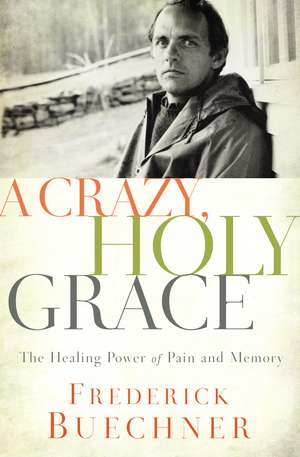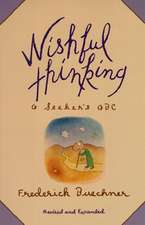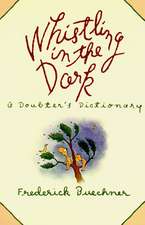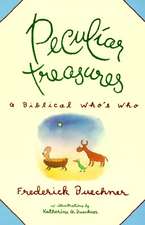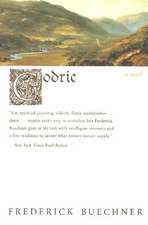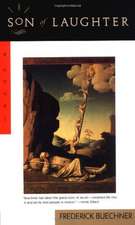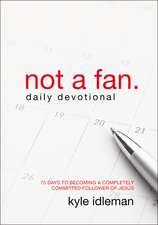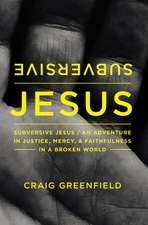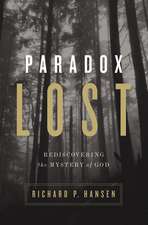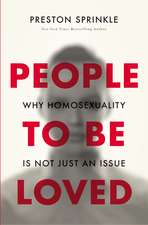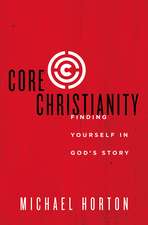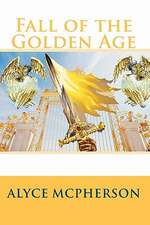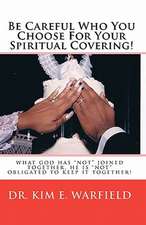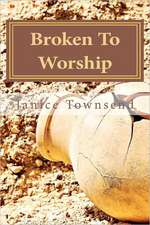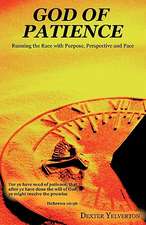A Crazy, Holy Grace: The Healing Power of Pain and Memory
Autor Frederick Buechneren Limba Engleză Paperback – 2 oct 2017
Frederick Buechner has grappled with the nature of pain, grief, and grace ever since his father committed suicide when Buechner was a young boy. He continued that search as a father when his daughter struggled with anorexia. In this essential collection of essays, including one never before published, Frederick Buechner finds that the God who might seem so silent is ever near. He writes about what it means to be a steward of our pain, and about this grace from God that seems arbitrary and yet draws us to his holiness and care. Finally he writes about the magic of memory and how it can close up the old wounds with the memories of past goodnesses and graces from God.
Here now are the best of Buechner’s writings on pain and loss, covering such topics as the power of hidden secrets, loss of a dearly beloved, letting go, resurrection from the ruins, peace, and listening for the quiet voice of God. And he reveals that pain and sorrow can be a treasure—an amazing grace.
Buechner says that loss will come to all of us, but he writes that we are not alone. Crazy and unreal as it may sometimes seem, God’s holy, healing grace is always present and available if we are still enough to receive it.
Preț: 96.39 lei
Nou
Puncte Express: 145
Preț estimativ în valută:
18.45€ • 19.19$ • 15.23£
18.45€ • 19.19$ • 15.23£
Carte disponibilă
Livrare economică 25 martie-08 aprilie
Preluare comenzi: 021 569.72.76
Specificații
ISBN-13: 9780310349761
ISBN-10: 0310349761
Pagini: 144
Dimensiuni: 134 x 203 x 10 mm
Greutate: 0.12 kg
Editura: ZONDERVAN
Colecția Zondervan
Locul publicării:Grand Rapids, United States
ISBN-10: 0310349761
Pagini: 144
Dimensiuni: 134 x 203 x 10 mm
Greutate: 0.12 kg
Editura: ZONDERVAN
Colecția Zondervan
Locul publicării:Grand Rapids, United States
Recenzii
“Frederick Buechner brings the reader to his knees, sometimes in laughter, sometimes in an astonishment very close to prayer, and at the best of times in a combination of both.”
“Frederick Buechner doesn’t just show us how to write; he shows us how to live.”
“Frederick Buechner gives new life to Christian truth.”
“Frederick Buechner has inspired me not only with his writing, but with his generosity of spirit. I’m incredibly thankful.”
“Frederick Buechner is a beacon. When we can’t remember what is true and what it all means, he’s the person we turn to.”
“Frederick Buechner is not just a wordsmith but an image-smith – he’s the bridge between Gutenberg and Google.”
“He isn’t trying to persuade – he’s trying to understand what he himself believes and thinks. And that honesty is more persuasive than the most polished argument.”
“He raises the bar not only for Christian writers, but for all of literature.”
“If Frederick Buechner subordinated his nature and chose to write on naughts and nothings, he would still exalt his readers. When he is in representative harmony and writes of the accessibility of God to humanity and of humanity’s agreement with its potential divinity, we, the readers, are lifted up, buoyed up, and promised wholeness.”
“To each new generation, his work is a revelation.”
“With profound intelligence, Buechner’s novel does what the finest, most appealing literature does: it displays and illuminates the seemingly unrelated mysteries of human character and ultimate ideas... One of our finest writers.”
“You don’t have to be in the habit of going to church to listen to such a literary minister; you don’t have to be a believer to be moved by Mr. Buechner’s faith.”
“Frederick Buechner doesn’t just show us how to write; he shows us how to live.”
“Frederick Buechner gives new life to Christian truth.”
“Frederick Buechner has inspired me not only with his writing, but with his generosity of spirit. I’m incredibly thankful.”
“Frederick Buechner is a beacon. When we can’t remember what is true and what it all means, he’s the person we turn to.”
“Frederick Buechner is not just a wordsmith but an image-smith – he’s the bridge between Gutenberg and Google.”
“He isn’t trying to persuade – he’s trying to understand what he himself believes and thinks. And that honesty is more persuasive than the most polished argument.”
“He raises the bar not only for Christian writers, but for all of literature.”
“If Frederick Buechner subordinated his nature and chose to write on naughts and nothings, he would still exalt his readers. When he is in representative harmony and writes of the accessibility of God to humanity and of humanity’s agreement with its potential divinity, we, the readers, are lifted up, buoyed up, and promised wholeness.”
“To each new generation, his work is a revelation.”
“With profound intelligence, Buechner’s novel does what the finest, most appealing literature does: it displays and illuminates the seemingly unrelated mysteries of human character and ultimate ideas... One of our finest writers.”
“You don’t have to be in the habit of going to church to listen to such a literary minister; you don’t have to be a believer to be moved by Mr. Buechner’s faith.”
Descriere
When pain is real, why is God silent?
Frederick Buechner has grappled with the nature of pain, grief, and grace ever since his father committed suicide when Buechner was a young boy. He continued that search as a father when his daughter struggled with anorexia. In this essential collection of essays, including one never before published, Frederick Buechner finds that the God who might seem so silent is ever near. He writes about what it means to be a steward of our pain, and about this grace from God that seems arbitrary and yet draws us to his holiness and care. Finally he writes about the magic of memory and how it can close up the old wounds with the memories of past goodnesses and graces from God.
Here now are the best of Buechner’s writings on pain and loss, covering such topics as the power of hidden secrets, loss of a dearly beloved, letting go, resurrection from the ruins, peace, and listening for the quiet voice of God. And he reveals that pain and sorrow can be a treasure—an amazing grace.
Buechner says that loss will come to all of us, but he writes that we are not alone. Crazy and unreal as it may sometimes seem, God’s holy, healing grace is always present and available if we are still enough to receive it.
Frederick Buechner has grappled with the nature of pain, grief, and grace ever since his father committed suicide when Buechner was a young boy. He continued that search as a father when his daughter struggled with anorexia. In this essential collection of essays, including one never before published, Frederick Buechner finds that the God who might seem so silent is ever near. He writes about what it means to be a steward of our pain, and about this grace from God that seems arbitrary and yet draws us to his holiness and care. Finally he writes about the magic of memory and how it can close up the old wounds with the memories of past goodnesses and graces from God.
Here now are the best of Buechner’s writings on pain and loss, covering such topics as the power of hidden secrets, loss of a dearly beloved, letting go, resurrection from the ruins, peace, and listening for the quiet voice of God. And he reveals that pain and sorrow can be a treasure—an amazing grace.
Buechner says that loss will come to all of us, but he writes that we are not alone. Crazy and unreal as it may sometimes seem, God’s holy, healing grace is always present and available if we are still enough to receive it.
Notă biografică
Frederick Buechner is the author of more than thirty published books and has been an important source of inspiration and learning for many readers. A prolific writer, Buechner's books have been translated into twenty-seven languages. He has been called a "major talent" by the New York Times, and "one of our most original storytellers" by USA Today. A finalist for the Pulitzer Prize and the National Book Award, Buechner has been awarded honorary degrees from institutions including Yale University and Virginia Theological Seminary.
